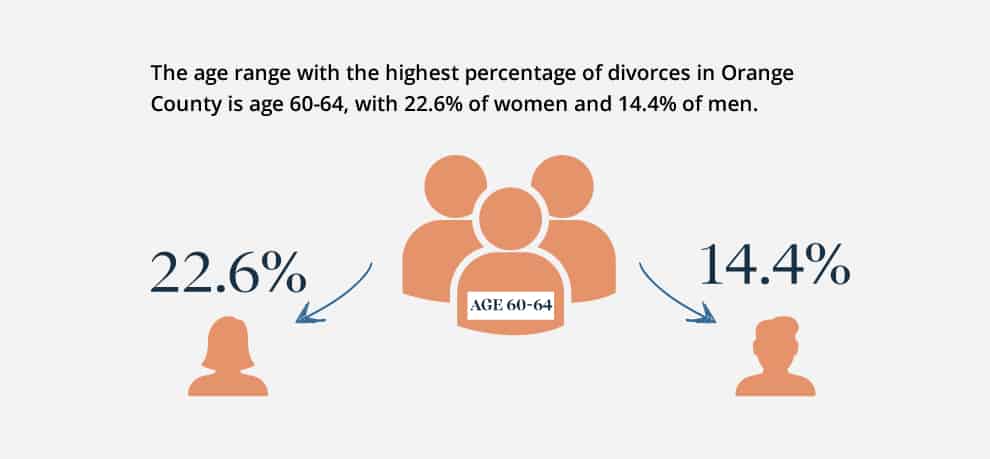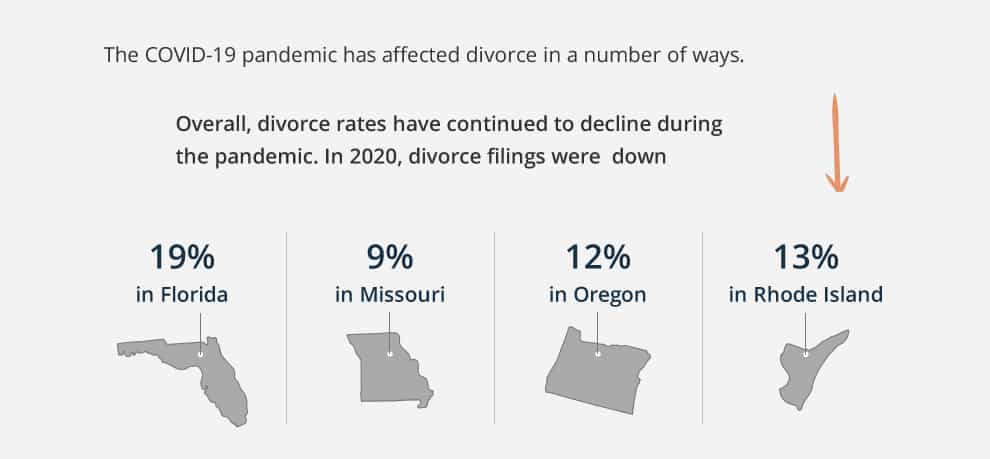Divorce Lawyer
Orange County Divorce Lawyer with a Practical Approach
If divorce is on the table then you need a legal advocate who will guide and protect you. At Pedrick Law Group, APC, we take a sensitive approach to solving family law issues with a practical mindset. You will not go through this alone.
We are here to provide the legal services you need to reach a beneficial agreement or settlement. We want to help you move forward with your new life on the right foot.
California divorce involves many moving parts that may appear overwhelming. Our experienced family law attorney team will help you focus on what is important. Gregory J. Pedrick is a board-certified family law specialist who has helped clients in Los Angeles County and Ventura County for over 25 years. Susan L. Goldenberg applies an additional 27 years of experience to help clients protect what matters most.
Schedule a free consultation now
Divorces are always complicated because while the word divorce has a ring of finality to it, getting to that finality is seldom easy. This is true whether a couple has been married for only a few years, or if they have spent many years together.
Every couple going through a divorce is facing a number of issues that must be addressed. The longer a couple is together, the more entangled their legal, financial, and personal affairs are. Since California is a community property state, those who are preparing for divorce in Orange County must hire an attorney who is well versed in all aspects of California’s divorce statutes.
While the following information does not constitute legal advice, it may help you understand some of the issues that are facing you. Remember that laws not mentioned here may affect your divorce. You need to speak to a lawyer that understands family law matters to protect yourself.
Guidance Offered by Orange County Family Law Firms
When you are in the midst of a divorce, emotions are running hot and there are many decisions that must be made. You and your spouse are unique, your marriage is not like any other marriage and that means your divorce will not be the same as the last divorce case which a law firm has handled.
This is why you want to hire a family lawyer who has experience handling a range of issues including:
- Mediation
- Child custody and support
- Spousal support
- Dealing with paternity issues
- Providing minor’s counsel
- Dealing with sole and community property
- Contested and uncontested divorces
- Property division
- Division of debt
- Assisting with parenting plans
- Aiding with family-owned businesses during divorce
- Military divorces
- Same-sex couple divorces
These are just some issues that a family lawyer can help you navigate. Whether you have made the decision to file for divorce, or your spouse has served you with divorce papers, you need an advocate who will stand by your side and help you navigate the complex issues associated with your divorce.
You can choose to go through a legal separation without legal representation. It would not be recommended by most experts you trust, such as your financial advisor. No matter how peaceful the divorce is, a lawyer provides protection.
The divorce may become contested at any time. Your spouse’s lawyer may be aggressive and push your spouse toward a more aggressive strategy. The court may also make mistakes (such as overestimating your income) that would cripple you financially. Working with a lawyer gives you a resource for solutions when you’re confronted by problems like these.
California Family Law Statutes During Divorce
Filing for a dissolution of marriage in Orange County means you will need to understand the divorce laws in California. Divorce is a matter of state law, so California has an entirely unique set of laws that apply to family law and divorce.
First, California has residential requirements.
Filing in California has residential requirements
You must meet several residency standards if you want to file for divorce in California. First, at least one of the spouses involved must have been a California resident for more than six months. They must also have lived in the county they’re filing in for at least three months.
California is a community property state
In a community property state, the law considers married couples to merge into a single unit called a “community”. Most assets and debts that the couple acquires during the marriage are considered to be community property. If a divorce happens, the court will prefer to divide community property equally.
There are some exceptions and complications. For example, When one partner has inherited property, had property prior to the marriage, or there is a prenuptial or postnuptial agreement in place, property division can be more complicated.
These agreements also may impact how debt is divided during an Orange County divorce. There could be additional issues to handle if a business agreement exists between partners or if you and your spouse both own portions of the business.
California is a “no-fault” divorce state
In a no-fault divorce state, the law does not require the spouse who filed the divorce petition to prove that the other spouse did something wrong. In this state, people may leave a marriage for any reason. It does not have to be justified with proof of adultery, abuse, or reckless behavior.
The law goes further than not requiring proof. The fault is not considered, so the court will rarely even apply penalties for proof of acts like adultery. The law will not punish cheating spouses with less support or property based on these factors.
California is not a “common law” marriage state
The state of California does not recognize common-law marriages. It does not afford common-law marriages or unregistered domestic partnerships with any privileges in the state. It also does not require any filing to end these marriages. You can complete your separation without legal action.
One person can file for divorce
Another consequence of California’s no-fault rule is that it only takes one person to file for divorce. The spouse initiating the divorce does not require the consent or signature of the other spouse. If you receive a divorce notice, you will have a limited time to respond before the court makes a ruling without your input.
Once a motion for divorce has been filed, you have nearly no options to halt the proceedings if you weren’t the one who filed it. Legal strategies may be used to delay parts of the trial so evidence can be gathered, but the divorce won’t stop unless the petition is withdrawn.
This is not a complete list of the ways that California may be different from other states that you know. Other laws may apply when children, businesses, and interstate assets are involved. Dealing with a business as part of an Orange County divorce is stressful and can jeopardize your livelihood. The sooner you contact an attorney, the better off you will be in the long run.
Children: Custody and Support Matters
Regardless of the number of children you have, and no matter how smooth the divorce process seems to be going, you and your spouse will likely not come to an immediate agreement on what is best for your children.
What are the different kinds of custody in California?
California law operates around two different kinds of custody. The two types of custody orders are:
- Legal custody: Empowers you to make important decisions about your child such as the health care they receive, where they attend school, etc. The court will often award joint legal custody to couples seeking an amicable divorce. When only one parent is given the power to make these decisions, it is known as “sole legal custody”.
- Physical custody: Empowers you to have your child reside with you. Joint physical custody involves the child switching between both parent’s houses. When only one parent is given physical custody, they have sole physical custody.
Negotiating child custody
A family law lawyer can be an essential partner during these early, emotional stages. Experienced family law lawyers have gone through this stage enough times to understand what works to get negotiations back on track. In general, you want negotiations to continue because summary judgments may be applied if you can’t reach an agreement on your own.
The court will attempt to find a solution that meets the best needs of the children. Due to that concern, not all agreements will be accepted by the court, even if they are negotiated.
Remember, physical custody determines where the child lives. The court could determine the parents are awarded joint custody which means the child would divide their time equally between the home of both parents. Legal custody is nearly always awarded to each parent as the decisions which impact a child today, and in the future, are best made jointly. This includes medical decisions, religious upbringing, and education.
Parents should also be aware that once a custody and support order is issued by the court, this does not mean that it is set in stone permanently. Should circumstances change, either spouse has the right to ask the court to take a second look at the arrangement.
What rights do parents with legal custody have?
Parents who are awarded legal custody have the right to make key decisions about a child’s upbringing. If you have sole legal custody, you will be able to make all of the following choices:
- Where the child attends school or childcare
- What church the child attends and whether they receive religious instruction at school
- Whether the child is treated by psychiatrists, psychologists, or other types of mental health professionals
- Where the child goes to receive services from doctors, dentists, or other health professionals
- What school extracurriculars the child picks up, and what sports, summer camps, or vacation locations they visit.
It is not common to be awarded full legal custody unless there are safety concerns or your spouse waives any rights. Parents who are awarded joint legal custody are expected to act in good faith to solve disagreements about the child’s upbringing. Disagreements could easily end up back in court.
If parents share custody, do children split time equally between both parents?
Unfortunately, it is very rare that a deal can be worked out that offers the same amount of time to both parents. Children have the right to stable lives, and that can mean some parents aren’t awarded the same amount of time in joint custody agreements.
For example, if one parent lives several hours from the other, the parent closest to the children’s school, friends, and religious life would probably be more likely to be awarded custody during the school week. The other parent may get weekends instead because making long trips on school nights would generally be considered disruptive to the child.
If both parents are close to one another, the court might find it easier to accept an equitable agreement.
How does visitation work?
Visitation is the term that describes how parents plan to share time with their children. Any parent who has less than half the time with the children is said to have “visitation”. Visitation orders are common in any case where the children cannot equally split their time.
These orders are often the result of agreements between the parents. These agreements may be arranged in one of four different ways:
- Visitation on a schedule: Detailed visitation plans to prevent conflicts and confusion. Courts like to see them in negotiations, and will help you develop them. Visitation schedules are often designed to include holidays, special occasions (like birthdays, mother’s day, father’s day, and other important dates for the family), and vacations.
- Reasonable (open negotiation) visitation: A reasonable visitation order allows the parents to work out schedules on a continuing basis. This is the most flexible option for amicable divorces where the couple is determined to show a united face for the child. If there are disagreements or misunderstandings, an open schedule can cause issues between the parents, and it may go back to the courts.
- Supervised visitation: This is used when the children’s safety and well-being require that visits with the other parent be supervised by you, another adult, or a professional agency.
- No visitation permitted: This option is used when it is not in the best interest of the children for the parent to have any contact with the children. These orders often come with restraining orders or other types of legal force.
Complex Divorces Require Experienced Attorneys
There are many factors that could complicate your divorce. Interstate and international factors will make any divorce or custody case more complicated. However, that’s not even the beginning of the legal issues that may come up in complex divorces.
For example, If you have a spouse who is an active service member, you may need to observe federal laws and guidelines to move forward with a divorce.
Large estates, businesses, and real estate holdings can make any divorce more complicated due to the higher stakes. In these cases, you can expect your spouse to hire experienced local legal professionals who may pursue the case more aggressively.
It can also complicate things if you are both involved in the same business. Fortunately, our attorneys have some background in business issues related to divorce. We can offer some more in-depth perspectives on these cases.
If you are both actively involved in a family business, you want to make sure the attorney you hire has the skill and experience you need to help you make sure your interests are protected during the process. The more complicated your financial picture, the more likely you are to need someone who understands how to deal with property valuations, and business valuations.
Finding the Right Orange County Divorce Attorney
You want a lawyer who has extensive experience dealing with California’s court system when you are going through a divorce. This is especially true if the divorce is going to be contested by your spouse.
Divorce law is simply different from most other forms of law, and each state has its own set of rules. You should not go into a divorce alone if you don’t know how family court operates in California.
You need someone who will represent your interests fairly and ensure that the court understands your views regarding some issues you will be facing. Our Orange County family law attorneys will give you the support that you need to fight for the best possible outcomes.
Helping You See the Big-Picture Solution
If you and your spouse disagree on matters of divorce, then proceedings might become adversarial. However, we try to help both parties take a step back and see the big picture. Our goal is to help you and the other party reach an amicable solution through communication, compromise, and an agreement outside of litigation.
This isn’t just because negotiation is healthier. It’s because everyone involved is more likely to get a solution they like if you can manage to stay at the negotiation table. If the divorce cannot be settled amicably, the court will make their own ruling, and they may not consider either parent’s biggest priorities.
If going to court is the best option for the circumstances of your unique case, our experienced litigation attorneys will protect your interests through each phase of the trial. We will prepare you in one-on-one sessions, aiming to get you the best possible result.
Our focus on family law cases means our lawyers are very at-home at the negotiating table. They know how to advocate for your interests, and how to de-escalate a situation before your partner leaves the table.
Children, Property, and Everything In Between
You and your spouse have built a personal and financial foundation that must be divided in divorce. While this process can feel stressful, a quick resolution can be found with communication, compromise, and a skilled legal advocate. Most importantly, we will help you protect time with your children and do what is best for them.
Part of what makes our firm different is that we can help with complex matters of divorce that touch other areas of your life, such as business law, domestic violence, and estate planning. Our experience in these other practice areas can make us well-positioned to support business clients in southern California.
We’ll use what we know about business finances to ensure that the court properly estimates your value, and knows what you can reasonably spend without damaging the legacy you’re leaving to your children. This will help to ensure a fairer deal when the court considers assigning alimony, child support, and other factors of the final agreement.
If you are a business owner, own complex assets, or are dealing with violence in the home, then we are more than capable to help you take the best next step.
Pedrick Law Group Has the Skill and Experience to Help
Divorce always means emotions are going to run high. We approach every divorce with compassion, and we are always responsive to the needs of our clients. We understand a divorce impacts every part of your life, and you need someone who will be aggressive when needed and willing to compromise when appropriate.
That is the difference you will find when you work with our offices during an Orange County divorce. We know when to compromise, but we will also be advocating for the outcome you desire.
Dissolving a marriage is difficult and you need to move forward with your life. We know a commonsense approach to divorce is necessary, yet we will be fully prepared to go to court and aggressively represent you on matters which you feel strongly about. We’ll help you every step of the way.
While we’re centered in Orange County, we help clients all over California. Contact us from San Diego, Santa Ana, Costa Mesa, Irvine, or Anaheim.
When you need a lawyer to help you with an Orange County divorce, contact Pedrick Law Group, APC, at 949-438-3886 to schedule a consultation. Whether you are ready to take a proactive approach to your divorce, or your spouse is hiding assets and misrepresenting the marital estate, we can help.
WHAT ARE THE LATEST FACTS, FIGURES AND TRENDS IN DIVORCE?
California is one of the most populous US States, at more than 32 million residents. A large population also means a lot of divorces. According to the latest US Census, 195,000 people reported getting divorced in the previous year. That’s enough to fill SoFi Stadium (home of the Rams and Chargers) 2.78 times! Here are some updates on trends in divorce in Orange County, California and the rest of the country.
Divorce in Orange County

Eleven percent of adults in Orange County are divorced, ranking it 18th in percentage of divorced people for counties in California, and 36th in the 50 most populous counties in the United States.
Within Orange County, the highest percentage of divorces is in Laguna Woods at 19%, followed by Los Alamitos, Seal Beach, Laguna Beach and Dana Point. The lowest percentage of divorced people is in Luna Park at 5%.

The hit show The Real Housewives of Orange County is infamous for instigating divorce. A total of eleven cast members divorced after appearing on the show. Across the franchise, vow renewals predict the couple divorcing soon after renewing their nuptials on the show – the first being housewife Vicki Gunvalson, a resident of Coto de Caza.
Other famous residents from Orange County who had high profile divorces include singers Gwen Stefani and Gavin Rossdale and golfer Tiger Woods.
California Divorce Facts
In 2019, California ranked 40th in the number of divorces per 1,000 women, at 13.4.
- About 67% of California parents are married, compared to 63% parents nationwide. Likewise, 65% of children ages 0-17 in California live with their biological, married parents, compared to 62% of children in the United States. This shows that the stability of family life in California is higher than the rest of the country.
- A marriage in California can be ended by divorce, legal separation, or annulment.
- One spouse or domestic partner can choose to end the marriage without the other’s participation.
- California is a “no fault” divorce state. To get a no fault divorce, one person claims “irreconcilable differences” as a reason to dissolve the marriage.
- It does not matter who is the first to file the divorce or separation case. The court does not give any preference to the first person to file or a disadvantage to the person who responds to the case.
Divorce and the Pandemic

- In fact, according to data from the American Family Survey, a majority of married Americans (58%) said that the pandemic has made them appreciate their spouse more, and fifty percent of couples surveyed reported that their commitment to marriage has deepened.
- Attorney Leslie Barbara reported an upswing in divorces based on extramarital affairs after COVID restrictions were eased. This is due to hotel closures and the lack of business travel during lockdowns – making it a lot harder to carry an affair.
- Custody cases during the pandemic also raised new issues – such as disagreements between parents about children wearing masks at playdates, nannies being vaccinated or whether or not children should attend school remotely.
US Divorce Trends
In 2019, the most recent year that statistics are available, the US divorce rate was 15.5 divorces per 1,000 married women, down from a divorce rate of 15.7 in 2018. This was a 40-year low in the number of divorces in the country. Just over one million women (1,042,174) divorced in 2019.

Between 1990 and 2019, the divorce rate decreased for those aged 15 to 44, whereas it increased for those aged 45 and older.
For both men and women, divorce rates declined with age
The Big Bucks in Celebrity Divorce
- 2021 was a big year for celebrity divorces and big financial settlements. In their settlement, Jeff Bezos kept three-quarters of the couple’s share of Amazon stock, and his ex-wife Mackenzie Scott was awarded the rest, totaling 4% of the company
- Melinda Gates’ net worth was $3.2 billion when she split from Bill Gates (his was $131 billion). It has not been decided who will get the 66,000 acre lakefront estate outside of Seattle.
- Another celebrity couple made headlines when the singer Kelly Clarkson split with her husband Brandon Blackstock, raising questions about men receiving spousal support. Blackstock was awarded $150,000 per month in alimony, half his original request.
- Kimye have yet to reach a divorce settlement, but when they do, they will divide $2.1 billion in assets.
Divorce Icons
- Two important divorce researchers passed away in 2021. Rosalind Cartwright was a scientist who studied divorced women’s dreams. After her second divorce she couldn’t sleep, which inspired her to perform overnight sleep studies in her Chicago lab with newly divorced women.
- Constance Ahrons was a psychotherapist who wrote the book “The Good Divorce” in 1994. It was a groundbreaking publication that guided couples in handling their divorce amicably and maintaining good relationships with their children.
- Though trends in divorce are always changing, the need for support through your divorce does not. Whether it’s mediation, child custody, spousal support or property division, we are here to help. Contact us and let’s talk about how we can help.
VIEW WHAT ARE THE LATEST FACTS, FIGURES AND TRENDS IN DIVORCE?



